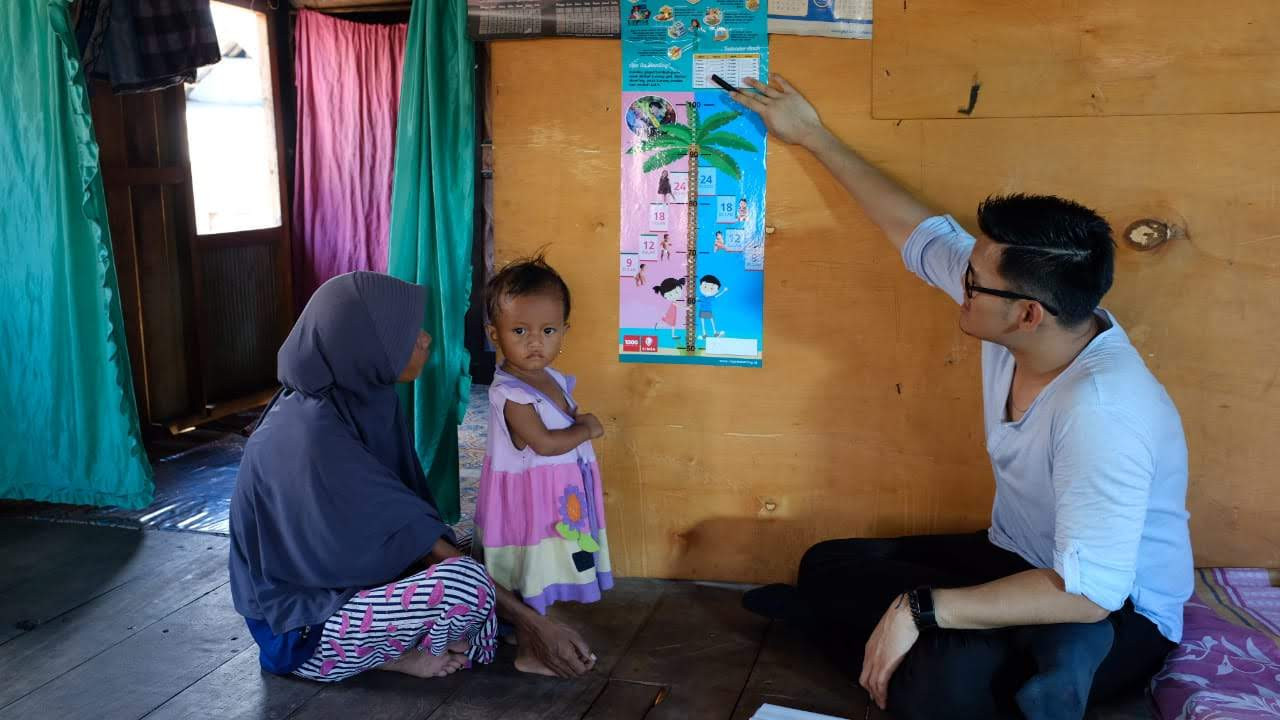Why the private sector should invest in stunting reduction in Indonesia
The World Bank estimates that a 1 percent loss in adult height due to childhood stunting is associated with a 1.4 percent loss in economic productivity.
Change Size
 Growing up: A health volunteer explains the features of a height chart to a mother in Rinca, on the fringes of Komodo National Park in East Nusa Tenggara. The province has a high stunting prevalence of 43 percent. (Gumilang Aryo Sahadewo/-)
Growing up: A health volunteer explains the features of a height chart to a mother in Rinca, on the fringes of Komodo National Park in East Nusa Tenggara. The province has a high stunting prevalence of 43 percent. (Gumilang Aryo Sahadewo/-)
O
n a sunny afternoon, children in a Jakarta slum were playing soccer while their mothers gathered on a porch outside the playing ground. Yanti, one of the mothers, told the group about her recent experience visiting a nearby community health clinic for her pregnancy check-up. Besides a routine examination, she also received a food package and comprehensive briefing on nutrition during pregnancy. Her provider told her to read the nutrition section in the “pink book”, a pregnancy bible for expecting mothers in Indonesia. She did not recall any specific emphasis on nutrition during her first pregnancy 12 years ago. Yanti’s experience was part of a large-scale national program to combat stunting, a largely irreversible condition, where a child is too short for his or her age.
The rate of stunting remains stubbornly high in Indonesia. Indonesia is currently ranked fifth among countries with the highest burden of stunting in children under 5 years. Childhood stunting is a silent emergency with negative consequences such as greater risks of illness and death, poor learning outcomes and poverty. The previous administration claimed it had reduced the prevalence of stunting to 28 percent, however, this percentage remains high because the World Health Organization (WHO) mandated the country to reduce the figure to 20 percent. President Joko “Jokowi” Widodo said stunting was the top priority for the newly appointed health minister. The country has set its objective to reduce the stunting rate to below 20 percent by 2030. Within the 11-year time span to reach the goal, one alternative is to leverage the private sector to invest in stunting reduction.
Indonesia is set to experience a demographic dividend in 2030, where the productive age population is expected to exceed the non-productive age population. This could turn into a curse if Indonesia is unable to improve its human resources to provide high-quality individuals for the labor force. Stunting affects both cognitive and physical development and reduces productive capacity, which subsequently impacts children’s ability to attain good education and training. As a result, freedom from stunting is a fundamental aspect of growth and development of children, who will become our future leaders and contribute to the workforce. The World Bank estimates that a 1 percent loss in adult height as a result of childhood stunting is associated with a 1.4 percent loss in economic productivity. It is also estimated that stunting contributes to overall gross domestic product losses of 4 to 11 percent in Asia and Africa. In this case, addressing stunting is imperative for everyone, not solely limited to government or public agencies, but also the private sector.
Indonesia is in need of integrated and multisectoral approaches to reduce stunting. Studies have shown that multisectoral, nutritional interventions could significantly reduce child stunting by 20 percent. These interventions should be directed not only in the period after birth but also before birth within the first 1,000 days from conception until the age of 2. This means that the key targets are pregnant women, mothers of infants, infants and young children. The private sector can join the fight against stunting through public-private partnerships (PPPs). These schemes allow the private sector to work alongside government and public agencies to contain costs and achieve the desired outcomes.
The role of the private sector in PPPs generally revolves around providing funds and other support for health programs initiated by governments, public agencies and NGOs. There are several types of PPP arrangements that can be implemented for nutritional interventions. First is a partnership for private investment, namely donor-led and business-corporate social responsibility models. One example is through donations of money or food to improve nutrition in a community.
Second is a partnership to leverage private finance, namely output-based aid and loans. For instance, food and beverage companies can provide financial support for the resources of nutritional and behavioral change programs in the community, while the government and public agencies are responsible for the program dissemination to communities. The private sector can invest in either of these arrangements as both have their benefits and drawbacks, but they offer opportunities worth exploring to accelerate stunting reduction. According to recent estimates in high-burden countries including Indonesia, every US$1 invested in stunting reduction will generate about $18 in economic returns.
Considering the magnitude of this problem, it is important for the private sector to contribute to developing sustainable solutions for stunting reduction programs in Indonesia, specifically on nutritional intervention. Continuing business as usual will be insufficient to close the resource gap to address this issue. By investing in stunting reduction, we will have an unprecedented opportunity to save children’s lives, build future human capital and drive faster economic growth. This is not solely the responsibility of the new administration, but also the private sector as a part of a country's economic system.
***
Master of Public Health Candidate at Columbia University.









